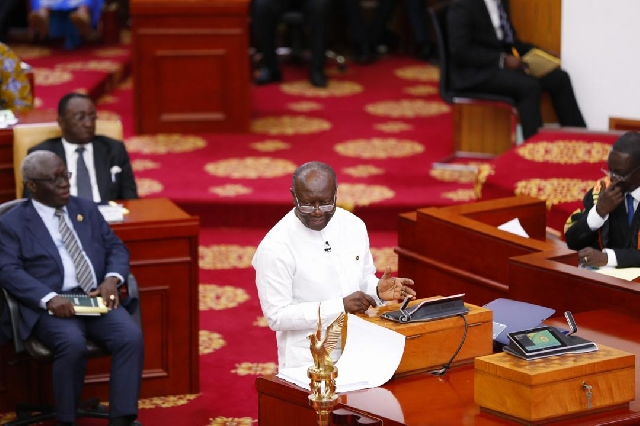Akufo-Addo government has set total revenue and grants for 2020 at GH¢67.1 billion, representing 16.8% of GDP.
The Finance Minister, Ken Ofori-Atta, announced in Parliament on Wednesday during the 2020 budget that a chunk of this target, some GH¢65.8 billion will be from domestic revenue.
This new target looks unrealistically ambitious because over the years government has failed to meet its revenue targets.
This year, for instance, total revenue and grants in the first half of 2019 reached GH¢22.77 billion, below the project target of GH¢26.96 billion, representing 15.5 per cent shortfall.
Experts fear that it is likely that 2019 target of GH¢58.8 billion will be missed.

Although no new taxes will be introduced in the 2020 budget statement to shore up the revenue mobilisation efforts, the Finance Minister told legislators that a complete review of Ghana’s structure will ensure that the government meets its 2020 revenue targets.
The government, meanwhile, hopes to spend GH¢85.9 billion in 2020, suggesting that it will spend GH¢18.8 billion more than the revenue it will generate next year.
Below is a summary of the government’s fiscal operation from 2019 to 2023.

Revenue measures
The Finance Minister said the government is committed to providing support to the Ghana Revenue Authority (GRA) in its ongoing reforms for 2020 and the medium term to “optimise revenue collection.”
He said the government will pursue the following revenue measures, among others, to boost domestic revenue:
i. Government shall renew and extend the National Fiscal Stabilisation Levy and Special Import Levies (SIL) for five years to support the Budget
ii. In line with Government policy, the personal income tax band will be adjusted and the necessary parliamentary approval sought to ensure that the 12% minimum wage increase for 2020 is tax-exempt.
iii. Personal Reliefs such as marriage relief, child education relief and old age relief, which were last adjusted in 2015, will also be reviewed upwards, consistent with the government’s commitment to supporting families.
To address the challenges of revenue mobilisation, Mr Ofori-Atta said the government would restructure the tax system and develop a comprehensive revenue policy and strategy.
“The Ghana Revenue Authority occupies a critical position in the economy and is responsible for approximately 70% of domestic revenues. After then years of integration, the government is ready to carry out the next generation of reforms in revenue administration,” he said.
He said a transformation programme centred around the three main themes of People, Technology, and Service will be structured with the new leadership of the GRA to create a ‘NEW GRA’ that will reflect the very best of efficiency and productivity.


